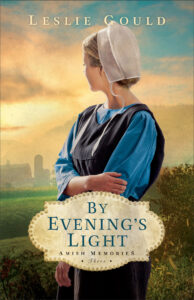Today, we have author Leslie Gould on the blog. She’ll be telling about her latest release, By Evening’s Light. Welcome, Leslie. First, tell our readers about your newest book.
Leslie Gould: By Evening’s Light is the third novel in my AMISH MEMORIES series. It’s Treva’s story, the youngest of the three Zimmerman sisters. She’s faced with the quintessential question of young adulthood: Should I stay where I grew up, or should I leave and create a new life elsewhere? Treva decides absolutely that she should go and leave her Plain family, her heritage, and her community behind. However, when her beloved aunt falls ill, she decides to stay—for a short time. But as she learns about her aunt’s story of grappling with staying in Lancaster County or leaving during the years following World War II, Treva begins to question her own motivation for leaving. As Treva’s life intersects with her aunt’s cherished memories, Treva struggles to reconcile her heritage with her future and God’s will for her own life.
Could you share the inspiration behind your book By Evening’s Light and what drew you to blend the Plain life of Lancaster County with Cold War Germany?
LG: I really love contrasting the lives of Plain people with the lives of non-Plain people during times of historical upheaval. The historical thread of the first book was set in pre–World War II Germany, while the historical thread of the second book was set in Lancaster County during the war, so it only made sense to have the third book explore the Cold War period, in both Germany and the US. After an estimated 75–80 million people around the world died because of World War II, one would hope a time of peace would prevail. Instead, nuclear war became a real possibility, resulting in the Cold War. Sometimes it’s tempting to believe Plain communities are insulated during times of worldwide conflict, but they’re not. Both the communities as a whole and individuals face decisions in response to current events.
Your Amish fiction novels often blend history, drama, romance, and faith. Can you discuss how you balance these elements in your storytelling to create a compelling narrative?
LG: By Evening’s Light—along with the other two books in the AMISH MEMORIES series—is a dual-time story, so balancing the elements of the historical thread and the contemporary thread often feels as if I’m plaiting an elaborate braid. The historical context provides a foundation for the story, high stakes for the historical protagonist, and ultimately insight and hope for the present- day characters. Drama and romance both add conflict and propel the stories forward, exploring deep emotions, losses, and longings. While faith often also contributes to the conflict, in my novels it ultimately helps bring resolution to both the historical and the contemporary stories.
By Evening’s Light explores the delicate balance of heritage and destiny. How do the characters in your book grapple with these themes, and why do you find them important to explore?
LG: For Treva, learning to treasure her heritage and how to incorporate it into her destiny is what she must grapple with. As Treva struggles with whether she’ll stay on the family farm or leave her Plain community and start over far, far away, she does grapple with the value of her heritage, how to incorporate it into her destiny, and what obligations she holds to the elders in her family who have made her current life possible. I think as humans, as we self-actualize, we must integrate both our childhood and our heritage into our lives as adults to fully reach our potential. Granted, it can be a lifelong process. But ignoring our heritage and childhood cuts off a part of our selves and who we truly are. Treva comes to the realization there’s no “far, far away.” There’s no leaving who we are behind.
The story involves the search for a missing concentration camp survivor against the backdrop of Cold War Germany. How did you research and approach writing about this historical period and setting?
LG: I researched everything from the causes and timeline of the Cold War to women spies in the 1940s, 50s, and 60s to the quadrants of Berlin and the train routes in and out of the city. I pored over books on the causes and on the day-by-day happenings during the Berlin Blockade and the buildup to the USSR obtaining the nuclear bomb. I read accounts of people living in Germany during the blockade and chatted with a woman from my hometown who was a child in Germany after World War II. I searched the Internet for information, but my best resources were books written by historians that dived deeply into the topics I needed to understand. Over the years, I’ve read extensively about World War II. Although I was familiar with the basics of the Cold War, the research was fascinating and—as always—a favorite part of the creative process for me.
Can you discuss the significance of family and heritage in By Evening’s Light and how they influence the characters’ decisions and actions?
LG: Yes! Part of the fear in leaving for the main characters in the historical and contemporary stories is denying their heritage and neglecting their elderly relatives. Tension grows as they must choose between their own dreams for their futures and their perceived obligations to the past. The significance of family and heritage is that both add tension to the stories while also connecting the past, present, and future. Ultimately, the characters must realize that they are in a long line of family members who faced the same difficult decisions.
Gabe Johnson’s return unexpectedly impacts the protagonist’s plans. What role does Gabe’s character play in the story, and what motivated you to author his return?
LG: Gabe pleasantly surprised me! In the first two books he’s the annoying younger brother of Conrad, who ends up marrying the oldest Zimmerman sister, Ivy. In the second book, Gabe joins the Army, deciding he definitely wants to leave the Plain life far behind. But By Evening’s Light, he returns home a bit broken and greatly humbled. His humility helps Treva be more imaginative about her future options—and more open to where God is leading her.
Your Amish romance novels consistently achieve bestseller status. What do you think resonates with readers in your storytelling that keeps them coming back for more?
LG: I’ve had readers report consistently in person, in emails, and in reviews that my stories are complex, that even though they love history they always learn something new about it in my dual- time stories, that they appreciate my depth of research, and that I have riveting storylines. I think all of those factors resonate with readers and keep them engaged in my novels.
As an author, how do you see your work contributing to the broader genre of Amish fiction, and what do you hope readers take away from your novels?
LG: I’ve written everything from a series inspired by four of Shakespeare’s plays (THE COURTSHIPS OF LANCASTER COUNTY) to a total of nine dual-time novels spanning US history from the Revolutionary War to the Cold War. I’ve also written about Plain people or post-Plain people and midwifery, adoption, addiction, mental health issues, and connections to the military. I hope that although the Amish have different norms from the general population, I’ve shown we share many of the same universal concerns in life as far as family and faith, plus the same general history, even if roles and responses have been and continue to be different.
How can readers connect with you?
LG: Please visit my website at LeslieGould.com. Sign up for my newsletter (where you’ll get all the latest information on new releases, giveaways, and book sales), and follow me on my social media platforms. I’m on Facebook (@LeslieGouldAuthor) and Instagram (@LeslieGouldWrites).
It was great having you today, Leslie! Thank you for dropping by. Readers, here’s a quick look at BY EVENING’S LIGHT:
 Treva Zimmerman finds herself at a crossroads in life after a heartbreaking failed relationship. Returning to Lancaster County to visit her Amish grandparents and elderly aunt, Treva plans to leave her Plain heritage behind for a fresh start in Alaska. Torn between the expectations of her community and her own desires, she seeks to follow her own path–but all that changes when her aunt Rosene suffers a heart attack.
Treva Zimmerman finds herself at a crossroads in life after a heartbreaking failed relationship. Returning to Lancaster County to visit her Amish grandparents and elderly aunt, Treva plans to leave her Plain heritage behind for a fresh start in Alaska. Torn between the expectations of her community and her own desires, she seeks to follow her own path–but all that changes when her aunt Rosene suffers a heart attack.
As her aunt recounts her own past–a poignant journey through Cold War Germany and a fervent desire to escape her Plain life to search for a lost love–Treva is determined to discover the whereabouts of Rosene’s former sweetheart. Amid the turmoil, their former farmhand Gabe Johnson returns unexpectedly, throwing Treva’s plans into further disarray.
While working hard to save the farm and explore her own destiny, Treva confronts her deep-rooted ties to her heritage and must decide if she will embrace her family’s legacy or break free from the pressures of her past to forge a life of her own.






